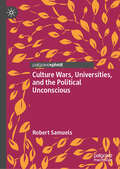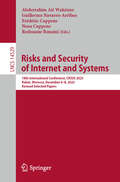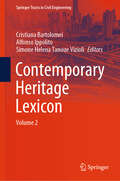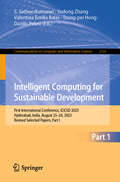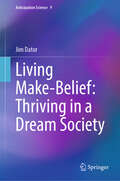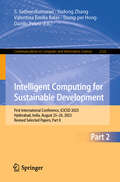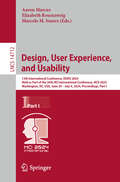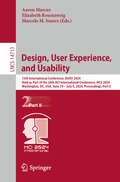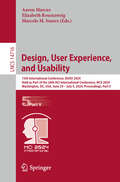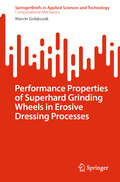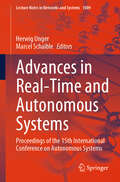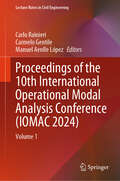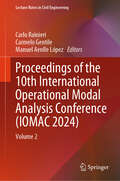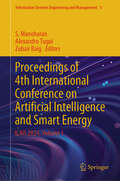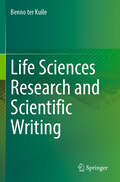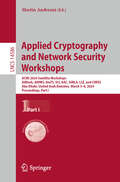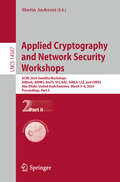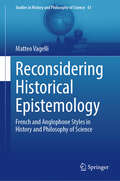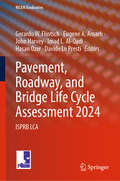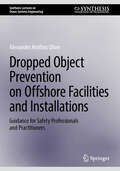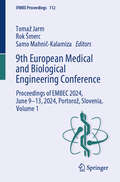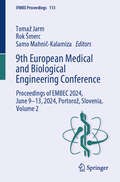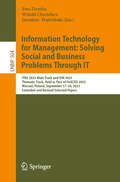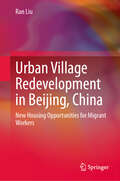- Table View
- List View
Culture Wars, Universities, and the Political Unconscious
by Robert SamuelsThis book argues that whenever we are talking about cancel culture, identity politics, political correctness, antisemitism, conspiracy theories, or the alt-Right, we are dealing with a culture war, which often pits two sides against each other in a split world of good and evil. These political representations rely on a set of unconscious processes best understand through psychoanalysis. As this book argues, if you want to comprehend the rhetoric of the Right, the Left, conservatives, and centrists, it is necessary to see how these ideologies rely on unacknowledged defense mechanisms, fantasies, fears, and desires. In fact, if we do not employ psychoanalytic concepts to examine our political investments, we will be unable to get to the root causes driving these social productions. Each chapter of this book looks at a specific writer‘s or politician’s take on contemporary culture wars. One of the reoccurring themes concerns the way free speech has been weaponized by different ideological formations, and this battle over free expression is often centered on the role that universities play in balancing the demands among competing social interests. This book will not only clarify what universities should be, but it will also help us to move beyond our polarized political world.
Risks and Security of Internet and Systems: 18th International Conference, CRiSIS 2023, Rabat, Morocco, December 6–8, 2023, Revised Selected Papers (Lecture Notes in Computer Science #14529)
by Frédéric Cuppens Guillermo Navarro-Arribas Nora Cuppens Abderrahim Ait Wakrime Redouane BenainiThis book constitutes the revised selected papers of the 18th International Conference on Risks and Security of Internet and Systems, CRiSIS 2023, which took place in Rabat, Morocco, during December 6–8, 2023. The 13 full papers and 2 short papers included in this volume were carefully reviewed and selected from 25 submissions. The papers detail security issues in internet-related applications, networks and systems.
Contemporary Heritage Lexicon: Volume 2 (Springer Tracts in Civil Engineering)
by Cristiana Bartolomei Alfonso Ippolito Simone Helena Tanoue VizioliThe book presents themes related to contemporary architecture as the results of diverse cultural influences and architectural legacies, manifested in a rich variety of styles, materials, and spatial perceptions. It consists of 24 chapters written by authors from various continents and contains the result of research highlighting contemporary architecture in relation to multiple aspects that are distinguished by their eclectic nature, characterized by the integration of diverse cultural and architectural influences. The book examines aspects involving material aspects, technologies, design, history, salvage, technologies, and digitization. The aspects covered are always filtered through research, which objectively integrates traditional and innovative approaches. Thus, the focus is to explore the contemporary lexicon not only in the field of architecture and engineering but in all those areas where this theme can be read with a meaningful vision. Contemporary architecture is constantly evolving, reflecting the changing needs of society and anticipating the challenges of the future.
Intelligent Computing for Sustainable Development: First International Conference, ICICSD 2023, Hyderabad, India, August 25–26, 2023, Revised Selected Papers, Part I (Communications in Computer and Information Science #2121)
by Tzung-Pei Hong Valentina Emilia Balas Danilo Pelusi Yudong Zhang S. SatheeskumaranThe two-volume proceedings set CCIS 2121 and 2122 constitutes the refereed proceedings of the First International Conference on Intelligent Computing for Sustainable Development, ICICSD 2023, which took place in Hyderabad, India, during August 25–26, 2023. The 46 papers included in these proceedings were carefully reviewed and selected from 138 submissions. They focus on digital healthcare, renewable energy, smart cities, digital farming, and autonomous systems.
Living Make-Belief: Thriving in a Dream Society (Anticipation Science #9)
by Jim DatorThis book shows how multiple developments have caused the world to move from “an information society” to a “dream society”. Ongoing social and technological forces are pushing us from a world of words, rationality, and truth into a world of images, performance, and make-belief. Rather than deny or reject this transformation, this book argues that one should understand and embrace it as waves of new futures that the world must strive to surf for fame and fun. As a political scientist and futurist, the author also offers hints of new goals and forms of governance fit for a dream society, as he demonstrates that all current systems are ineffective and dangerously obsolete. This book is of great interest to political philosophers, futures scientists, sociologists, and those interested in cultural studies.
Intelligent Computing for Sustainable Development: First International Conference, ICICSD 2023, Hyderabad, India, August 25–26, 2023, Revised Selected Papers, Part II (Communications in Computer and Information Science #2122)
by Tzung-Pei Hong Valentina Emilia Balas Danilo Pelusi Yudong Zhang S. SatheeskumaranThe two-volume proceedings set CCIS 2121 and 2122 constitutes the refereed proceedings of the First International Conference on Intelligent Computing for Sustainable Development, ICICSD 2023, which took place in Hyderabad, India, during August 25–26, 2023. The 46 papers included in these proceedings were carefully reviewed and selected from 138 submissions. They focus on digital healthcare, renewable energy, smart cities, digital farming, and autonomous systems.
Design, User Experience, and Usability: 13th International Conference, DUXU 2024, Held as Part of the 26th HCI International Conference, HCII 2024, Washington, DC, USA, June 29–July 4, 2024, Proceedings, Part I (Lecture Notes in Computer Science #14712)
by Aaron Marcus Marcelo M. Soares Elizabeth RosenzweigThis five-volume set LNCS 14712-14716 constitutes the refereed proceedings of the 13th International Conference on Design, User Experience, and Usability, DUXU 2024, held as part of the 26th International Conference, HCI International 2024, in Washington, DC, USA, during June 29 – July 4, 2024. The total of 1271 papers and 309 posters included in the HCII 2024 proceedings was carefully reviewed and selected from 5108 submissions. The DUXU 2024 proceedings were organized in the following topical sections: Part I: Information Visualization and Interaction Design; Usability Testing and User Experience Evaluation. Part II: Designing Interactions for Intelligent Environments; Automotive Interactions and Smart Mobility Solutions; Speculative Design and Creativity. Part III: User Experience Design for Inclusion and Diversity; Human-Centered Design for Social Impact. Part IV: Designing Immersive Experiences across Contexts; Technology, Design, and Learner Engagement; User Experience in Tangible and Intangible Cultural Heritage. Part V: Innovative Design for Enhanced User Experience; Innovations in Product and Service Design.
Design, User Experience, and Usability: 13th International Conference, DUXU 2024, Held as Part of the 26th HCI International Conference, HCII 2024, Washington, DC, USA, June 29–July 4, 2024, Proceedings, Part II (Lecture Notes in Computer Science #14713)
by Aaron Marcus Marcelo M. Soares Elizabeth RosenzweigThis five-volume set LNCS 14712-14716 constitutes the refereed proceedings of the 13th International Conference on Design, User Experience, and Usability, DUXU 2024, held as part of the 26th International Conference, HCI International 2024, in Washington, DC, USA, during June 29 – July 4, 2024. The total of 1271 papers and 309 posters included in the HCII 2024 proceedings was carefully reviewed and selected from 5108 submissions. The DUXU 2024 proceedings were organized in the following topical sections: Part I: Information Visualization and Interaction Design; Usability Testing and User Experience Evaluation. Part II: Designing Interactions for Intelligent Environments; Automotive Interactions and Smart Mobility Solutions; Speculative Design and Creativity. Part III: User Experience Design for Inclusion and Diversity; Human-Centered Design for Social Impact. Part IV: Designing Immersive Experiences across Contexts; Technology, Design, and Learner Engagement; User Experience in Tangible and Intangible Cultural Heritage. Part V: Innovative Design for Enhanced User Experience; Innovations in Product and Service Design.
Design, User Experience, and Usability: 13th International Conference, DUXU 2024, Held as Part of the 26th HCI International Conference, HCII 2024, Washington, DC, USA, June 29 – July 4, 2024, Proceedings, Part V (Lecture Notes in Computer Science #14716)
by Aaron Marcus Marcelo M. Soares Elizabeth RosenzweigThis five-volume set LNCS 14712-14716 constitutes the refereed proceedings of the 13th International Conference on Design, User Experience, and Usability, DUXU 2024, held as part of the 26th International Conference, HCI International 2024, in Washington, DC, USA, during June 29 – July 4, 2024. The total of 1271 papers and 309 posters included in the HCII 2024 proceedings was carefully reviewed and selected from 5108 submissions. The DUXU 2024 proceedings were organized in the following topical sections: Part I: Information Visualization and Interaction Design; Usability Testing and User Experience Evaluation. Part II: Designing Interactions for Intelligent Environments; Automotive Interactions and Smart Mobility Solutions; Speculative Design and Creativity. Part III: User Experience Design for Inclusion and Diversity; Human-Centered Design for Social Impact. Part IV: Designing Immersive Experiences across Contexts; Technology, Design, and Learner Engagement; User Experience in Tangible and Intangible Cultural Heritage. Part V: Innovative Design for Enhanced User Experience; Innovations in Product and Service Design.
Performance Properties of Superhard Grinding Wheels in Erosive Dressing Processes (SpringerBriefs in Applied Sciences and Technology)
by Marcin GołąbczakThis book presents a scientific study covering all issues related to the development and assessment of the functional properties of superhard grinding wheels with a metal bond. Abrasive grinding, especially with superhard grinding wheels, is still the basic method for efficient and accurate shaping of workpieces, especially from materials with high hardness and durability. Meeting the high requirements placed on grinding processes, with regard to obtaining high dimensional-shape accuracy and the desired quality of the surface layer as well as repeatability of grinding results, requires the use of rational methods for shaping the cutting surface of grinding wheels (CSGW) in dressing processes. Individual chapters of the monograph include • Characteristics of superhard grinding wheels including properties of superhard abrasive materials, metal binders, construction, and marking of technical characteristics of grinding wheels and areas of their application, • Parameters and methods for assessing the performance properties of superhard grinding wheels, including direct and indirect assessment parameters and economic aspects of assessing the dressing of superhard grinding wheels, • Characteristics of dressing methods for superhard grinding wheels, including conventional methods and erosive dressing methods. The erosive dressing methods include dressing with a high-pressure stream of liquids, liquids and abrasives, laser dressing and electrochemical, electroerosive and hybrid methods. • Results of own research on electrochemical and electroerosion dressing processes, including mathematical modeling of these dressing processes and experimental research. The book meets the needs of both scientific and technical staff, providing knowledge about modern methods of shaping CPS of superhard grinding wheels. It will be an important reference in the libraries of technical universities as a research aid for students, technical staff, and research and teaching staff.
Beyond Houses: Architectural Thinking and Practice for Climate, Disaster and Forced Displacement Crises (The Urban Book Series)
by A. Nuno Martins Carmen Mendoza-Arroyo Liliane Hobeica Jorge León Adib HobeicaThis book delves into the complexities of urban crises, focusing on the efforts of researchers and practitioners who confront precarious housing and forced displacement. Originating from the 8th International Conference on Building Resilience (convened in November 2018 in Lisbon, Portugal), this book examines challenges across diverse contexts and geographies, including Chile, India, Kenya, Mexico, Portugal, and Syria. Structured in three parts, the book's 12 chapters address disaster prevention and recovery, humanitarian architecture, and issues related to housing, migration, and urban forced displacement. The narratives emphasize vulnerabilities, community-driven design, and cross-cultural perspectives, comprehensively reviewing global urban planning, slum upgrading, and incremental housing strategies. The contributions engage readers with practical insights for mitigating urban vulnerability and intellectual analyses that consider the complexities of life amid systemic injustices. Ultimately, the authors suggest integrating architectural practice with social work within communities to address intricate urban housing challenges.
Advances in Real-Time and Autonomous Systems: Proceedings of the 15th International Conference on Autonomous Systems (Lecture Notes in Networks and Systems #1009)
by Herwig Unger Marcel SchaibleThe 15th International conference on "Autonomous Systems" is addressing an important topic for computing systems and communication networks due to increasingly complex environments they are working in. Therefore, this conferences addresses methods and solutions enabling such systems to independently adapt themselves to changed environmental conditions, are able to learn from different sources and to process external requests dependably, safely and timely. The solutions presented here range from hardware to system design to individual applications. The book contains the results of the researchers presented at this conference, which is supported by GI (German Society of informatics) and other organisations Real-Time Systems Expert Committees. The target audience is students and researchers in computer science and automation technology, engineers, programmers and users of automation and communication systems.
Proceedings of the 10th International Operational Modal Analysis Conference: Volume 1 (Lecture Notes in Civil Engineering #514)
by Carlo Rainieri Carmelo Gentile Manuel Aenlle LópezThis volume gathers the latest advances and innovations in the field of operational modal analysis and structural health monitoring, as presented at the 10th International Operational Modal Analysis Conference (IOMAC), held in Naples, Italy on May 22-24, 2024. The contributions cover a diverse range of topics, including AI for data interpretation, automatic modal parameter estimation, Digital Twin, modal testing methods, instrumentation and case studies, model correlation and updating, modal-based SHM, modal mass estimation. Selected by means of a rigorous peer-review process, they will spur novel research directions and foster future multidisciplinary collaborations.
Proceedings of the 10th International Operational Modal Analysis Conference: Volume 2 (Lecture Notes in Civil Engineering #515)
by Carlo Rainieri Carmelo Gentile Manuel Aenlle LópezThis volume gathers the latest advances and innovations in the field of operational modal analysis and structural health monitoring, as presented at the 10th International Operational Modal Analysis Conference (IOMAC), held in Naples, Italy on May 22-24, 2024. The contributions cover a diverse range of topics, including AI for data interpretation, automatic modal parameter estimation, Digital Twin, modal testing methods, instrumentation and case studies, model correlation and updating, modal-based SHM, modal mass estimation. Selected by means of a rigorous peer-review process, they will spur novel research directions and foster future multidisciplinary collaborations.
Proceedings of 4th International Conference on Artificial Intelligence and Smart Energy: ICAIS 2024, Volume 1 (Information Systems Engineering and Management #3)
by Zubair Baig Alexandru Tugui S. ManoharanThis book presents a comprehensive collection of research chapters focusing on innovative solutions to energy and sustainability challenges. It reflects the collaborative efforts of researchers worldwide, showcasing novel approaches to complex problems. Topics discussed range from securing cyber-physical systems to revolutionizing healthcare with AI and robotics, emphasizing sustainable research. The book emphasizes smart and sustainable energy solutions, highlighting advancements in solar panel efficiency, fault analysis, and fuzzy-controlled converters for grid-tied photovoltaic systems. Additionally, it explores AI's transformative potential in water solutions, agriculture, and renewable energy technologies across domains like smart cities, transportation, and healthcare. The insights shared aim to inspire further research, foster discussions, and drive real-world impact toward a resilient, inclusive, and sustainable future. · Discusses issues and offers sustainable solutions to meet the challenges faced by today's economy and industry. · Presents recent research in the sustainable transformation of engineering and technological systems. · Serves as a valuable resource for both academic researchers and industry practitioners interested in Artificial Intelligence (AI) and smart energy sectors.
Life Sciences Research and Scientific Writing
by Benno ter KuileScientific writing is a trade that can and must be learned and not a form of art that is limited to the talented. The real constraint for writing a good scientific article is most of the time not the usage of the English language, but the conversion of outcomes of a set of experiments into a coherent and convincing scientific story. This book is designed to guide junior scientists in the Life Sciences writing their thesis and first manuscripts, along this uphill struggle. All aspects of building up and publishing a forceful scientific narrative are covered, from designing experiments to dealing with the reviewers’ comments. This book takes you step by step through the process of writing a paper. It starts by discussing how to collect and organize data and make an outline. The actual writing starts with the Results section, as this is the heart of any research paper. The Discussion interprets your data in the framework of the existing literature and explains the novel insights you obtained. The Introduction is written to pose the questions that are answered in the Discussion and give the necessary background information. It is written after the Results and Discussion to make sure it is a perfect match. The M&M is the easiest to write. A good abstract is essential for attracting readers. How to write that is described in detail. The title is the last piece of the puzzle. The book contains many practical examples that explain the general principles of good writing. These examples are all from the Life Sciences and so are the anecdotes that illustrate the concepts, making the information directly applicable. All kinds of tips and suggestions are provided for improving readability and accessibility of your manuscript, thus making it easier acceptable. In addition, background information on the basics of science is supplied that helps to avoid common mistakes that cause rejection of manuscripts that report on otherwise good science.
Applied Cryptography and Network Security Workshops: ACNS 2024 Satellite Workshops, AIBlock, AIHWS, AIoTS, SCI, AAC, SiMLA, LLE, and CIMSS, Abu Dhabi, United Arab Emirates, March 5–8, 2024, Proceedings, Part I (Lecture Notes in Computer Science #14586)
by Martin AndreoniThis two-volume set LNCS 14586-14587 constitutes the proceedings of eight Satellite Workshops held in parallel with the 22nd International Conference on Applied Cryptography and Network Security, ACNS 2024, held in Abhu Dabhi, United Arab Emirates, during March 5-8, 2024. The 33 full papers and 11 poster papers presented in this volume were carefully reviewed and selected from 62 submissions. They stem from the following workshops: 6th ACNS Workshop on Application Intelligence and Blockchain Security (AIBlock 2024). 5th ACNS Workshop on Artificial Intelligence in Hardware Security (AIHWS 2024). 6th ACNS Workshop on Artificial Intelligence and Industrial IoT Security (AIoTS 2024). 5th ACNS Workshop on Secure Cryptographic Implementation (SCI 2024). 1st Workshop on Advances in Asymmetric Cryptanalysis (AAC 2024). 6th ACNS Workshop on Security in Machine Learning and its Applications (SiMLA 2024). 1st Workshop on Low-Latency Encryption (LLE 2024). 4th ACNS Workshop on Critical Infrastructure and Manufacturing System Security (CIMSS 2024).
Applied Cryptography and Network Security Workshops: ACNS 2024 Satellite Workshops, AIBlock, AIHWS, AIoTS, SCI, AAC, SiMLA, LLE, and CIMSS, Abu Dhabi, United Arab Emirates, March 5–8, 2024, Proceedings, Part II (Lecture Notes in Computer Science #14587)
by Martin AndreoniThis two-volume set LNCS 14586-14587 constitutes the proceedings of eight Satellite Workshops held in parallel with the 22nd International Conference on Applied Cryptography and Network Security, ACNS 2024, held in Abhu Dabhi, United Arab Emirates, during March 5-8, 2024. The 33 full papers and 11 poster papers presented in this volume were carefully reviewed and selected from 62 submissions. They stem from the following workshops: 6th ACNS Workshop on Application Intelligence and Blockchain Security (AIBlock 2024). 5th ACNS Workshop on Artificial Intelligence in Hardware Security (AIHWS 2024). 6th ACNS Workshop on Artificial Intelligence and Industrial IoT Security (AIoTS 2024). 5th ACNS Workshop on Secure Cryptographic Implementation (SCI 2024). 1st Workshop on Advances in Asymmetric Cryptanalysis (AAC 2024). 6th ACNS Workshop on Security in Machine Learning and its Applications (SiMLA 2024). 1st Workshop on Low-Latency Encryption (LLE 2024). 4th ACNS Workshop on Critical Infrastructure and Manufacturing System Security (CIMSS 2024).
Reconsidering Historical Epistemology: French and Anglophone Styles in History and Philosophy of Science (Studies in History and Philosophy of Science #61)
by Matteo VagelliThis book explores the key conceptual stakes underpinning historical epistemology. The strong Anglophone interest in historical epistemology, since at least the 1990s, is typically attributed to its simultaneously philosophical and historical synthetic approach to the study of science. Yet this account, considered by critics to be an unreflective assumption, has prevented historical epistemology from developing a clear understanding and definition, especially regarding how precisely historical and philosophical reflections on the sciences should be combined. Thus, this book uniquely analyses how the problems and tensions inherent to the “contemporary” phase of historical epistemology can be clarified by reference to the “classical” French phase. The archaeological method of Michel Foucault, which draws on and transforms fundamental insights by Gaston Bachelard and Georges Canguilhem, is used to exert an enduring influence on the field—especially through the work of Ian Hacking and his philosophical cum historical analyses of “styles of scientific reasoning”. Though this book is of great value to academic specialists and graduate students, the fact it addresses questions broad in scope ensures it is also relevant to a range of scholars in many disciplines and will provoke discussion among those interested in foundational issues in history and philosophy of science.
Pavement, Roadway, and Bridge Life Cycle Assessment 2024: ISPRB LCA (RILEM Bookseries #51)
by John Harvey Imad L. Al-Qadi Hasan Ozer Gerardo W. Flintsch Eugene A. Amarh Davide Lo PrestiThis book highlights the latest advances, innovations, and applications in the field of LCA in pavements, bridges, and roadways, as presented by leading international researchers at the 6th International Symposium on Pavement, Roadway, and Bridge Life Cycle Assessment (ISPRB LCA2024), held in Arlington, VA, USA, on June 6–8, 2024. It covers a diverse range of topics concerning assessment of environmental impacts of pavements, bridges, and roadways, including environmental product declarations (EPDs) and use of life cycle assessment (LCA) in design, data, and case studies: LCA methodologies for transportation infrastructure, durability and service life assessments, maintenance strategies to enhance performance and minimize environmental impacts, evaluating the environmental impacts of materials and construction, recycling and reuse of materials, carbonation of concrete, pavement vehicle interaction, life cycle thinking in climate change planning, and climate change mitigation. The contributions, which were selected by means of a rigorous international peer-review process, present a wealth of exciting ideas that will open novel research directions and foster new multidisciplinary collaborations.
Dropped Object Prevention on Offshore Facilities and Installations: Guidance for Safety Professionals and Practitioners (Synthesis Lectures on Ocean Systems Engineering)
by Alexander Arnfinn OlsenThe prevention of dropped objects is an important component of safeguarding personnel, property and the maritime environment. This concise book has been developed to provide safety professionals and practitioners with specific guidance and criteria on the development, implementation and management of dropped object prevention programs which corresponds to a growing industry-wide development to mitigate and eliminate the hazards imposed by dropped objects. This book relates to the Class requirements for an onboard dropped object prevention program to be implemented on offshore assets, and provides the design requirements for equipment primary securing, secondary retention methods and securing for specific equipment, etc. This book is intended for use by offshore installation Owners, Operators, and Companies whose intention is to prepare for, and ultimately apply for optional Class notations highlighting the installation’s compliance with dropped object safety management. For the benefit of context, the book uses the provisions which relate specifically to the DOPP and DOPP+ notations.
9th European Medical and Biological Engineering Conference: Proceedings of EMBEC 2024, June 9-13, 2024, Portorož, Slovenia, Volume 1 (IFMBE Proceedings #112)
by Samo Mahnič-Kalamiza Tomaž Jarm Rok ŠmercThis book informs on new trends, challenges, and solutions, in the multidisciplinary field of biomedical engineering. It covers traditional topics in biomechanics and biomedical signal processing, as well as recent trends relating to the applications of artificial intelligence and machine learning methods in medicine and biology, and to bioengineering education. Gathering the second volume of the proceedings of the 9th European Medical and Biological Engineering Conference (EMBEC 2024), held on June 9-13, 2024, in Portorož, Slovenia, this book bridges fundamental and clinically-oriented research, emphasizing the role of translational research in biomedical engineering. It aims at inspiring and fostering communication and collaboration between engineers, physicists, biologists, physicians and other professionals dealing with cutting-edge themes in and advanced technologies serving the broad field of biology and healthcare.
9th European Medical and Biological Engineering Conference: Proceedings of EMBEC 2024, June 9-13, 2024, Portorož, Slovenia, Volume 2 (IFMBE Proceedings #113)
by Samo Mahnič-Kalamiza Tomaž Jarm Rok ŠmercThis book informs on new trends, challenges, and solutions, in the multidisciplinary field of biomedical engineering. It covers traditional topics in biomechanics and biomedical signal processing, as well as recent trends relating to the applications of artificial intelligence and IoT in healthcare, wearable devices for patient monitoring, monitoring of medical devices, machine learning applications in medical data, among others. Gathering the second volume of the proceedings of the 9th European Medical and Biological Engineering Conference (EMBEC 2024), held on June 9-13, 2024, in Portorož, Slovenia, this book bridges fundamental and clinically-oriented research, emphasizing the role of translational research in biomedical engineering. It aims at inspiring and fostering communication and collaboration between engineers, physicists, biologists, physicians and other professionals dealing with cutting-edge themes in and advanced technologies serving the broad field of biology and healthcare.
Information Technology for Management: ITBS 2023 Main Track and ISM 2023 Thematic Track, Held as Part of FedCSIS 2023, Warsaw, Poland, September 17–20, 2023, Extended and Revised Selected Papers (Lecture Notes in Business Information Processing #504)
by Ewa Ziemba Witold Chmielarz Jarosław WątróbskiThe present book includes extended and revised versions of a set of selected papers submitted to the Topical Area of Information Technology for Business and Society, ITBS 2023, and two Thematic Tracks: Information System Management, ISM 2023, and Knowledge Acquisition and Management, KAM 2023, held in Poland, Warsaw, during September 17- 20, 2023. ITBS 2023 received 26 submissions, from which 6 full papers and 2 short papers have been accepted; for ISM 2023 3 full papers and 1 short paper have been accepted from 21 submissions; and for KAM 2023 1 full paper has been accepted from 7 submissions. From the 6 submissions to DSH 2023, no paper passed the extended reviews. The accepted papers are grouped in sections on IT in Improving of Management Systems, Approaches to Improving of Social Problems, and Methods of Solving Business.
Urban Village Redevelopment in Beijing, China: New Housing Opportunities for Migrant Workers
by Ran LiuThe book provides a multi-stage assessment of the changing housing opportunities of migrant workers in the three stages of Beijing’s urban village development (emergence, erasure and preservation). The volume re-theorizes Henry Lefebvre’s notion of the “right to the city” as a largely property-based concept that falls within the city’s hybrid tenure matrix of varying degrees of tenure security and formality that is undergoing entrepreneurialization or gentrification. This is another highly valuable contribution to China studies from the geographical perspective of the “territorial politics” at play in the process of urban village redevelopment, which has fostered a new propertied landowning class as winners, while moving low-wage migrants. The book takes the reader on a fascinating journey from peri-urban villages to IT worker villages to artists’ villages, revealing a restless landscape of urbanism and state-centered governance, as well as bottom-up counterplots. The fieldwork explores the contradictions of urban village redevelopment in Beijing. On the one hand, it is state-dominated and yet creates new housing opportunities for migrants; on the other, it disrupts old orders but also encourages new forms of grassroots alliances. The empirical studies of Beijing’s urban villages enrich Henry Lefebvre’s discourse on “planetary urbanisation,” Gilles Deleuze and Félix Guattari’s notion of the “rhizome,” and Elinor Ostrom’s ideas on the wise management of the “commons.”
